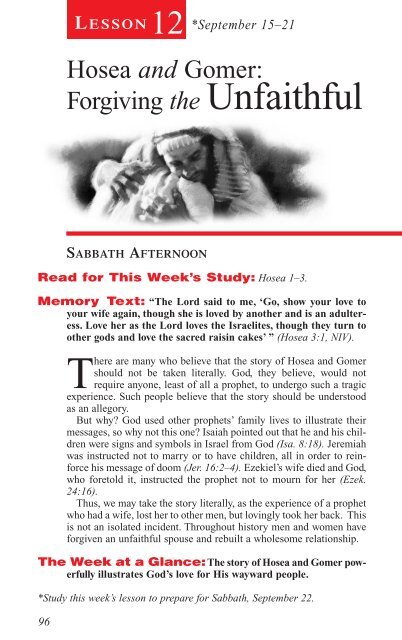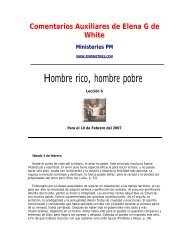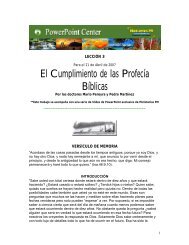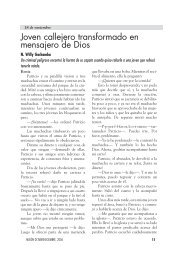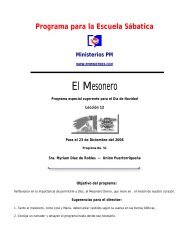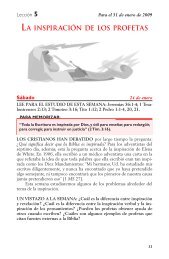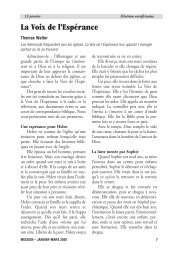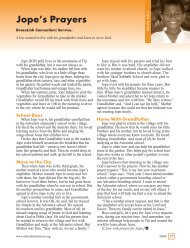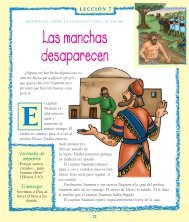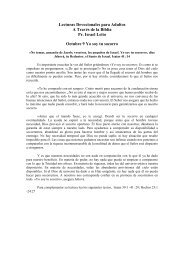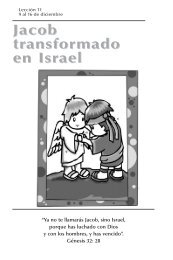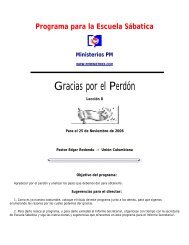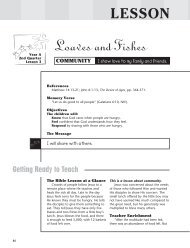Hosea and Gomer: Forgiving the Unfaithful
Hosea and Gomer: Forgiving the Unfaithful
Hosea and Gomer: Forgiving the Unfaithful
You also want an ePaper? Increase the reach of your titles
YUMPU automatically turns print PDFs into web optimized ePapers that Google loves.
L ESSON12*September 15–21<strong>Hosea</strong> <strong>and</strong> <strong>Gomer</strong>:<strong>Forgiving</strong> <strong>the</strong> <strong>Unfaithful</strong>96SABBATH AFTERNOONRead for This Week’s Study: <strong>Hosea</strong> 1–3.Memory Text: “The Lord said to me, ‘Go, show your love toyour wife again, though she is loved by ano<strong>the</strong>r <strong>and</strong> is an adulteress.Love her as <strong>the</strong> Lord loves <strong>the</strong> Israelites, though <strong>the</strong>y turn too<strong>the</strong>r gods <strong>and</strong> love <strong>the</strong> sacred raisin cakes’ ” (<strong>Hosea</strong> 3:1, NIV).There are many who believe that <strong>the</strong> story of <strong>Hosea</strong> <strong>and</strong> <strong>Gomer</strong>should not be taken literally. God, <strong>the</strong>y believe, would notrequire anyone, least of all a prophet, to undergo such a tragicexperience. Such people believe that <strong>the</strong> story should be understoodas an allegory.But why? God used o<strong>the</strong>r prophets’ family lives to illustrate <strong>the</strong>irmessages, so why not this one? Isaiah pointed out that he <strong>and</strong> his childrenwere signs <strong>and</strong> symbols in Israel from God (Isa. 8:18). Jeremiahwas instructed not to marry or to have children, all in order to reinforcehis message of doom (Jer. 16:2–4). Ezekiel’s wife died <strong>and</strong> God,who foretold it, instructed <strong>the</strong> prophet not to mourn for her (Ezek.24:16).Thus, we may take <strong>the</strong> story literally, as <strong>the</strong> experience of a prophetwho had a wife, lost her to o<strong>the</strong>r men, but lovingly took her back. Thisis not an isolated incident. Throughout history men <strong>and</strong> women haveforgiven an unfaithful spouse <strong>and</strong> rebuilt a wholesome relationship.The Week at a Glance: The story of <strong>Hosea</strong> <strong>and</strong> <strong>Gomer</strong> powerfullyillustrates God’s love for His wayward people.*Study this week’s lesson to prepare for Sabbath, September 22.
SUNDAY September 16<strong>Hosea</strong> <strong>and</strong> <strong>Gomer</strong>When you consider <strong>the</strong> kind of intimate relationship that <strong>the</strong> Lordsought with His people, a relationship compared with marriage (Hos.2:19, 20; Isa. 62:5), <strong>the</strong>n <strong>the</strong> imagery <strong>and</strong> symbolism that takes placehere becomes clearer.From what we can tell, <strong>Hosea</strong>’s prophetic ministry spanned <strong>the</strong>reigns of Uzziah (790 –739), Jotham (750–732), Ahaz (735–715), <strong>and</strong>Hezekiah (729 – 686), kings of Judah. This acknowledges a ministryof about forty years <strong>and</strong> corresponds with <strong>the</strong> idea that both his ministry<strong>and</strong> his marriage commenced about <strong>the</strong> same time. Nothing moreis known about <strong>the</strong> prophet as a person. His fa<strong>the</strong>r, Beeri, is not mentionedelsewhere in <strong>the</strong> Bible. His hometown is not identified. Hismessages address <strong>the</strong> nor<strong>the</strong>rn kingdom of Israel, <strong>and</strong> he surelyresided <strong>the</strong>re, <strong>the</strong> only literary prophet to do so. These were <strong>the</strong> closingyears of Israel’s history, but <strong>Hosea</strong> does not record <strong>the</strong> fall toAssyria in 722 B.C. He must have moved to Judah <strong>and</strong> written his bookbefore that event. His ministry is dated by kings of Judah.Based on numerous allusions to baking in <strong>Hosea</strong> 7:4–8, some suspectthat <strong>Hosea</strong> was a baker by profession. He describes <strong>the</strong> oven, itsfire, <strong>and</strong> <strong>the</strong> kneading <strong>and</strong> rising of <strong>the</strong> dough.Read <strong>Hosea</strong> 1:1, 2. What did God tell <strong>Hosea</strong> to do? What was <strong>the</strong>symbolism behind this action? See also Jer. 3:1, 2, 9; 13:27; Ezek.16:15, 16; 23:17–19.________________________________________________________________________________________________________________________________________Was <strong>Gomer</strong> a prostitute? While <strong>the</strong> NIV calls <strong>Gomer</strong> adulterous, <strong>the</strong>Hebrew text does not call her a harlot but uses <strong>the</strong> phrase“woman/wife of harlotry.” There are several options: (1) She could be<strong>the</strong> daughter or gr<strong>and</strong>daughter of a harlot (some descendants driftedinto <strong>the</strong> profession <strong>the</strong>mselves). (2) She could be a woman who showssuch tendencies. (3) She may be called a harlot by one with aprophetic knowledge of <strong>the</strong> future. (4) The book was written yearslater, by which time her character was fully known.<strong>Gomer</strong> was obviously a real person. The value of <strong>Hosea</strong>’s relationshipwith a real unfaithful wife has so much more meaning than if <strong>the</strong>story were a mere allegory. The Lord used this account to give Hispeople a powerful message about what <strong>the</strong>ir spiritual unfaithfulnesswas really like. No doubt He was seeking to draw <strong>the</strong>m back toHimself.97
MONDAY September 17<strong>Gomer</strong>’s <strong>Unfaithful</strong>nessSoon after <strong>Hosea</strong> married <strong>Gomer</strong>, we are told that she “bore him” ason (Hos. 1:3, NIV). The text indicates that <strong>Hosea</strong> can claim to be <strong>the</strong>fa<strong>the</strong>r of <strong>the</strong> child. <strong>Gomer</strong> had two more children, but <strong>the</strong> text does notsay that she bore <strong>the</strong>m to <strong>Hosea</strong>, just that she “gave birth to a daughter,”<strong>and</strong> “had ano<strong>the</strong>r son” (vss. 6, 8, NIV). The language allows for<strong>Hosea</strong> not to have been <strong>the</strong> fa<strong>the</strong>r. Some Bibles openly interpret <strong>the</strong>texts to say just that.The first son was named Jezreel, which means “God scatters.” Thenext child was a girl named Lo-ruhammah, which means “not loved.”Though God gives <strong>the</strong> names, it would be appropriate for <strong>Hosea</strong> toindicate that he does not love a child that is not his. The final child isa son named Lo-ammi, meaning “not my people.” Again, this could bea sign that <strong>Hosea</strong> does not accept <strong>the</strong> child as his. In fact, <strong>Hosea</strong> doesdeclare that he cannot show his love to her children because <strong>the</strong>y are<strong>the</strong> result of adultery, conceived in disgrace (Hos. 2:4, 5).What are <strong>Hosea</strong>’s charges regarding <strong>Gomer</strong>? Hos. 2:5, 8.________________________________________________________________________________________________________________________________________It may seem preposterous to think that any person might not knowwho brings home <strong>the</strong> food, but <strong>the</strong>re are several ways to underst<strong>and</strong><strong>and</strong> apply <strong>the</strong>se passages. We may take a cue from <strong>the</strong> application to<strong>the</strong> Israelites. They credited Baal—<strong>the</strong> god of rain <strong>and</strong> fertility—with<strong>the</strong>ir harvests of <strong>the</strong> fields <strong>and</strong> vineyards (grain <strong>and</strong> wine), <strong>the</strong>ir wool,<strong>and</strong> <strong>the</strong>ir oilseeds. They considered <strong>the</strong>ir gold <strong>and</strong> silver also as giftsfrom Baal <strong>and</strong> used <strong>the</strong>se metals lavishly in <strong>the</strong> manufacture of imagesto him (see Hos. 8:4, 13:2). Imagine God’s reaction to <strong>the</strong>ir obeisanceto Baal all <strong>the</strong> while He was providing rain for <strong>the</strong>ir crops in additionto all <strong>the</strong>ir o<strong>the</strong>r blessings.There is a certain blindness that comes in with sin. This blindnesscauses reasoning to be clouded so that persons can come to such stupidconclusions, conclusions <strong>the</strong>y use to justify stupid actions.What has been your own experience with <strong>the</strong> power of sin toblind your mind? What o<strong>the</strong>r Bible accounts reveal this spiritualdanger? See, for instance, John 9. What steps can you taketo protect yourself from falling into this blindness?98
TUESDAY September 18Spiritual AdulteryAs we’ve seen, if <strong>the</strong> Bible uses <strong>the</strong> idea of marriage to depict <strong>the</strong>intimate relationship that God seeks with His people—<strong>the</strong>n adultery,even whoredom, are appropriate symbols of what happens whenGod’s people are not spiritually faithful to Him.Of all <strong>the</strong> ways that married people can hurt each o<strong>the</strong>r, adultery hasto be one of <strong>the</strong> worst. A married couple, through physical intimacy,creates a sacred environment that only <strong>the</strong>y <strong>the</strong>mselves, as one flesh,should ever enter. To violate that is to violate a sacred trust; it’s toshare with ano<strong>the</strong>r what should belong only to that couple.Read Mat<strong>the</strong>w 5:32. What can we discern here from Christ’s wordsabout just how bad adultery is?________________________________________________________________________________________________________________________________________The real issue, however, in <strong>the</strong> story of <strong>Hosea</strong> isn’t marital infidelity;it’s spiritual apostasy; it’s about God’s people going after o<strong>the</strong>r gods.Today most of us are not poly<strong>the</strong>ists; we don’t openly seek <strong>and</strong> worshipwhat we believe are o<strong>the</strong>r divine entities (Satan knows we’re toosophisticated for that). However, spiritual adultery isn’t dead amongus. There are numerous ways in which we can be lured into this kindof adultery, even whoredom.What are some things that we face today that could lead us, as individuals,or even as a church, into spiritual adultery?________________________________________________________________________________________________________________________________________We mustn’t be fooled: Bit by bit, little by little, we can slowly belured away from total dedication <strong>and</strong> faithfulness to God. Slowly butsurely <strong>the</strong> ways of <strong>the</strong> world, its methods, its ideology, <strong>and</strong> its moralviews can cause us to depart from <strong>the</strong> intimate <strong>and</strong> close relationship thatGod wants with us, <strong>and</strong> before we know it, we’re committing spiritualadultery.None of us are immune to <strong>the</strong> temptations of spiritual adultery.What are some Bible texts that, if obeyed, could help protect us?Find <strong>the</strong> texts, write <strong>the</strong>m down, <strong>and</strong> bring <strong>the</strong>m to class onSabbath. See, for instance, Phil. 4:8, Col. 2:6, 1 Pet. 4:1.99
WEDNESDAY September 19Bearing <strong>the</strong> Fruit of <strong>Unfaithful</strong>nessSin is always what it has been: <strong>the</strong> most deadly <strong>and</strong> destructive forcein <strong>the</strong> universe. However pleasurable it can be, in one way or ano<strong>the</strong>r,it always reaps bitter results. How many men <strong>and</strong> women, for instance,thinking <strong>the</strong>y would find happiness through <strong>the</strong>ir adulterous affairs,ended up bringing only sadness <strong>and</strong> pain to <strong>the</strong>mselves <strong>and</strong> o<strong>the</strong>rs?What happens to <strong>Gomer</strong> as she plays <strong>the</strong> harlot? Read Hos. 2:1–13.________________________________________________________________________________________________________________________________________What parable of Jesus does this story remind you of? See especiallyHos. 2:7.________________________________________________________________________________________________________________________________________All through <strong>the</strong> history of ancient Israel, <strong>the</strong> people were tempted toworship idols, images of “silver, <strong>and</strong> gold, of brass, iron, wood, <strong>and</strong>stone, which see not, nor hear, nor know” (Dan. 5:23). Again, wemight not be tempted today to bow down <strong>and</strong> worship idols, but wecan be just as easily swept away from God by things of <strong>the</strong> world thatin <strong>the</strong> end do not satisfy us, that cannot meet <strong>the</strong> deepest needs of ourhearts, <strong>and</strong> that cannot save us in <strong>the</strong> day of judgment (see Jer. 2:27,28).A few years ago in <strong>the</strong> United States a man won <strong>the</strong> lottery, takinghome more than $113 million. Within a few years his life wasdestroyed; <strong>the</strong> money that had become his god also became <strong>the</strong> thingthat led to his ruin.The message that <strong>the</strong> Lord was seeking to teach His people through<strong>the</strong> story of <strong>Hosea</strong> <strong>and</strong> <strong>Gomer</strong> was this: Be faithful to <strong>the</strong> only Godthat <strong>the</strong>re is, <strong>the</strong> only God who loves you <strong>and</strong> who can save you <strong>and</strong>who can provide for your deepest needs.What has been your own experience with God working to keepyou close to Him? How have you responded? What changes doyou need to make that will help you better respond to Hisprompting?100
THURSDAY September 20Amazing LoveRead <strong>Hosea</strong> 2:14–23. Despite everything, what does <strong>the</strong> Lord tell<strong>Hosea</strong> to do? What’s <strong>the</strong> message <strong>the</strong>re for us?________________________________________________________________________________________________________________________________________<strong>Hosea</strong> had already condemned his wife, listed his accusations, <strong>and</strong>twice passed his verdict. (1) “ ‘Therefore I will block her path . . .’ ”(Hos. 2:6, NIV). (2) “ ‘Therefore I will take away my grain . . .’ ” (vs.9, NIV). We are prepared for <strong>the</strong> third <strong>and</strong> final verdict; it turns out,however, to be a surprise.<strong>Hosea</strong>’s first method of keeping his wife at home could not be alasting solution. She was bound to escape sooner or later, <strong>and</strong> even ifshe didn’t, <strong>the</strong>re could be no real satisfaction in keeping her that way.The second method had a greater chance for success. He had wooedher <strong>and</strong> won her once before, <strong>and</strong> he could do it again, provided hewas sincere. <strong>Hosea</strong> was instructed not just to take her back but to loveher as <strong>the</strong> Lord loves <strong>the</strong> Israelites.Read <strong>Hosea</strong> 3. What happens here, <strong>and</strong> what does it symbolize?________________________________________________________________________________________________________________________________________Note that <strong>Hosea</strong> is not only to take her back but to love her. Not justlove her but love her as God loves His people. <strong>Hosea</strong> followed God’scomm<strong>and</strong> again <strong>and</strong> bought her for 15 shekels of silver <strong>and</strong> a measureof barley. A slave normally comm<strong>and</strong>ed a price of 30 shekels (Exod.21:32), but ei<strong>the</strong>r <strong>the</strong> barley made up for <strong>the</strong> difference, or else <strong>Gomer</strong>went at a discount.<strong>Hosea</strong> taking back his adulterous wife mirrors <strong>the</strong> historical situation.God loves His people Israel even though <strong>the</strong>y have been adulterous.This is <strong>the</strong> message delivered by <strong>Hosea</strong> in words <strong>and</strong> in action.The Israelites can accept <strong>the</strong> faithfulness of God so much more easilywhen <strong>the</strong>y view <strong>the</strong> faithfulness of <strong>Hosea</strong> in taking back an unfaithfulwife.Are you where you should be in terms of your relationship with<strong>the</strong> Lord? Have you committed spiritual adultery? What hopecan you draw from <strong>the</strong> message that God has given us through<strong>the</strong>se chapters?101
FRIDAY September 21Fur<strong>the</strong>r Study: Read Ellen G. White, “Moral St<strong>and</strong>ards,” pp. 326–339, in The Adventist Home.123The story related in <strong>the</strong>se pages shows us just how willing God is toforgive His erring children. Violation of marriage through infidelityhas to be one of <strong>the</strong> worst ways a person can betray ano<strong>the</strong>r. And Goduses that imagery to depict how He views His own people’s spiritualadultery. Yet, He’s willing to forgive <strong>the</strong>m <strong>and</strong> take <strong>the</strong>m back. Thesechapters, if nothing else, reveal to God’s people <strong>the</strong> extent of Hisgrace.“Jesus is our Saviour today. He is pleading for us in <strong>the</strong> most holyplace of <strong>the</strong> heavenly sanctuary, <strong>and</strong> he will forgive our sins. It makesall <strong>the</strong> difference in <strong>the</strong> world with us spiritually whe<strong>the</strong>r we rely uponGod without doubt, as upon a sure foundation, or whe<strong>the</strong>r we areseeking to find some righteousness in ourselves before we come tohim. Look away from self to <strong>the</strong> Lamb of God, that taketh away <strong>the</strong> sinof <strong>the</strong> world. It is a sin to doubt. The least unbelief, if cherished,involves <strong>the</strong> soul in guilt, <strong>and</strong> brings great darkness <strong>and</strong> discouragement.It is saying that <strong>the</strong> Lord is false, that he will not do as he haspromised; <strong>and</strong> he is greatly dishonored.”—Ellen G. White, GospelWorkers (1892), p. 426.Discussion Questions:●1As a class, go over <strong>the</strong> Bible verses you used to answer <strong>the</strong>question at <strong>the</strong> end of Tuesday’s lesson. What practical principlescan you take from <strong>the</strong>se texts that can help us, as individuals <strong>and</strong>as a church, to protect ourselves from spiritual adultery?●2As a class, talk about what you believe <strong>the</strong> basic message foundin <strong>the</strong>se few chapters in <strong>Hosea</strong> is. What is <strong>the</strong> Lord telling us as achurch today through this story? What lessons should we notdraw from it?●3Are <strong>the</strong>re some church members who have fallen away? As aclass, make an effort to contact <strong>the</strong>se people, to show <strong>the</strong>m thatyou care about <strong>the</strong>m <strong>and</strong> that you are interested in <strong>the</strong>m. In whatways can you show <strong>the</strong>m <strong>the</strong> kind of grace <strong>and</strong> mercy that Godhas revealed to us through this story?Summary: The marriage of <strong>Hosea</strong> <strong>and</strong> <strong>Gomer</strong> is <strong>the</strong> best illustrationof forgiveness of an unfaithful spouse in <strong>the</strong> Bible. It’s also an exampleof God’s willingness to forgive us.102
INSIDEOne Man for Godby JOHN T. NOELStorI live in a village in sou<strong>the</strong>rn Sudan. Most people here belong to aProtestant church that has been working here for 100 years. Then JohnCharles came to our village. One Sunday he came to visit, <strong>and</strong> I invitedhim to worship with me. I was surprised when he said he had worshipedGod <strong>the</strong> day before. “Where do you worship on Saturday?” I asked. Hetold me that he worshiped in his hut, reading <strong>the</strong> Bible, singing, <strong>and</strong> prayingalone.“What do you believe that makes you worship on Saturday?” I askedhim.He answered, “First, let me tell you about Jesus.”I told him I knew about Jesus, but he said if I truly knew about Jesus, Iwould follow His comm<strong>and</strong>ments. After a long talk, he invited my bro<strong>the</strong>r<strong>and</strong> me to come to his home <strong>and</strong> hear more. John Charles read about God’slove from <strong>the</strong> Bible. He explained that God has outlined principles Hewants us to live by. He turned to <strong>the</strong> Ten Comm<strong>and</strong>ments <strong>and</strong> read eachone. When he read <strong>the</strong> fourth comm<strong>and</strong>ment, I realized that this was whyJohn Charles worshiped on Saturday. My bro<strong>the</strong>r <strong>and</strong> I believed.Our friends warned us that John Charles was a false teacher, but I sharedwith <strong>the</strong>m what he had taught us, including <strong>the</strong> Ten Comm<strong>and</strong>ments.Eventually ten of us studied with John Charles. We all believed, but ourfamilies refused to allow us to leave our Protestant church without a fight.My fa<strong>the</strong>r even brought his spear to try to convince me to reconsider. Irefused. But I had a problem. Like many men here, I had two wives. Iasked God what to do, <strong>and</strong> He told me to choose <strong>the</strong> wife who will sharemy faith. So I took both wives to <strong>the</strong> Bible studies with me. My first wifedid not want to follow my faith. So I gave her a dowry, <strong>and</strong> she returnedto her parents’ village. My second wife accepted <strong>the</strong> beliefs I now love,<strong>and</strong> we have been baptized.Some of <strong>the</strong> new believers have become lay evangelists to o<strong>the</strong>r villages.I remained in my village, where I study with people who want to knowmore about God. So far 28 people here have become Adventists <strong>and</strong> morethan one hundred in <strong>the</strong> area, thanks to John Charles’ fearless ministry.Even my parents are interested in learning God’s truths from <strong>the</strong> Bible.Your mission offerings are making a difference in <strong>the</strong> lives of many inSudan <strong>and</strong> throughout <strong>the</strong> world.JOHN T. NOEL shares his faith in his home village in sou<strong>the</strong>rn Sudan.Produced by <strong>the</strong> General Conference Office of Adventist Mission.Web site: www.adventistmission.org103


